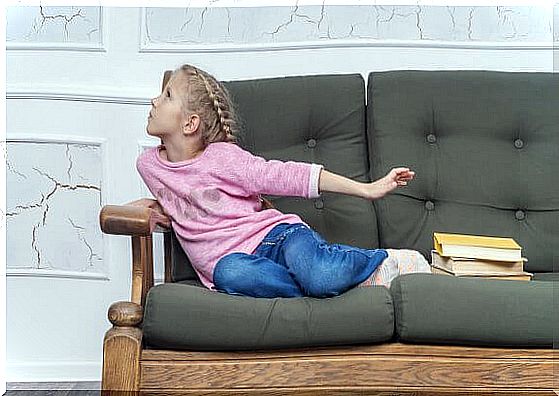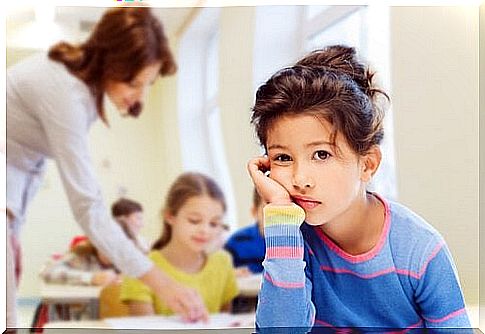My Son Makes Excuses Not To Go To School

Making excuses or simply refusing to go to school often can hide more serious and worrisome real motives in a child, to the point of rejecting an activity or obligation. Next, find out if your child is making excuses for not going to school and possible reasons for doing so.
Some of the most common excuses for not going to school
Just before going to school, your child may have an upset stomach, headache, or sore throat. This pain will get better once you allow it to stay at home, but it will show up again the next day.
In addition, the child may show his displeasure by crying or throwing a tantrum. Older children, in turn, may show challenging or even aggressive behavior towards their parents, refuse to get up or prepare to go to school, or else run away from school or home and present episodes of bad mood.
Why do some kids make excuses?
Excuses for not going to school can have an internal or external origin. Next, we’ll look at the causes of each of these types.
Internally Originated Excuses
First, the child may feel anxiety or a crippling fear of leaving the safety of their parents and home.
For example, the child may think that something bad is going to happen if he is not with his parents at home. Or that she’s going to get lost and her parents won’t be able to find her. She might even believe that parents could die.
Likewise, excuses can also happen due to family situations. In cases of divorce, abuse or domestic violence, children can develop a fear so great that they do not want to leave the house. They want to keep their parents from fighting and make excuses for attention.
In other cases, there are children who avoid going to school because they have a learning problem that has not been properly diagnosed.
Older children, on the other hand, may want to stay home simply because they find it more enjoyable than going to school. They want to sleep late, stay on the internet, watch television, play video games or do any other activity.

Excuses of external origin
In relation to external reasons, social factors should be highlighted. In these cases, children are afraid to face situations such as getting on the bus, writing on the blackboard or speaking in front of their teachers and peers. As they are afraid of failing, they use excuses to avoid this situation.
Another cause is interpersonal problems. In young children, it can happen that they consider themselves ugly or insufficient, or even think that no peer wants to play with them.
In addition, they may be threatened or humiliated at school. This reason is the most common among teenagers. Bullying is a serious issue that parents and teachers must be involved in to stop as soon as possible.
Also, there are physical changes. During adolescence, young people are more concerned about their physical appearance, such as being overweight or underweight. This leads them to have low self-esteem.
In the case of girls, starting to develop earlier or more visibly can be a cause for anguish. In addition to these insecurities, there are the hormonal problems that come with age. In this new stage, still, they cease to be the oldest and most experienced children and become younger and inexperienced teenagers.
When apologies can be made
In fact, excuses for not going to class are quite common and can occur at any time. However, they occur more frequently in children between 5 and 7 years old, and between 10 and 13 years old. In fact, it’s estimated that up to 25% of school-age children will at some point make excuses to avoid going to school.
In younger children, this situation can happen after a holiday, a vacation or after an illness. This may be because she ended up getting used to her family’s attachment. It can also happen after the death of a relative, change of school or house, among other reasons.
9 practical tips for parents
Before thinking your child’s excuse is just plain lame, think about the possibilities below:
- Try to find the source of your excuses.
- Consider that the most common symptoms of excuses, such as fever, headache, upset stomach, nausea and/or vomiting, are not the real cause. So look at the intensity and frequency of these supposed symptoms.
- Be patient and don’t despair.
- Don’t rush or react negatively, or say your fears are unfounded. Don’t force your child to go to class without first knowing the reasons.
- Remember that constant fears can trigger anxiety disorders, phobias, or panic attacks in the future.
- Keep in mind that school causes a lot of anxiety in children as it is not the protected environment of the home. This may be one of the reasons for the excuses for not going to class.
- Handle the situation without reprimanding the child and without belittling her feelings. This way you can prevent the problem from getting worse.
- Talk to your child’s teachers, classmates and siblings to best handle the situation.
- A psychologist or other professional can offer practical suggestions for each particular case. Don’t forget you are not alone.

Problems that can cause frequent apologies
When the child persists in making excuses for not going to school, it becomes a worrying situation. In such cases, it is advisable that you seek support from a mental health professional. Remember that this will be very important throughout your child’s growth phase.
Not going to school and seeing friends out of fear and anxiety can lead to serious school and social problems. In the long term, it could also lead to complete abandonment of studies, violent behavior and even affect the person economically due to the difficulty of keeping a job.
Social isolation and relationship problems are also possible consequences. As a child grows up to be an adult, this situation can cause anxiety, depression, panic and personality disorders.
While making excuses for not going to school is very common in school-age children, you need to be patient and try to find the source of the problem. Thus, by overcoming the situation, the little one will be able to enjoy their school experience to the fullest. And you will be calmer too!









